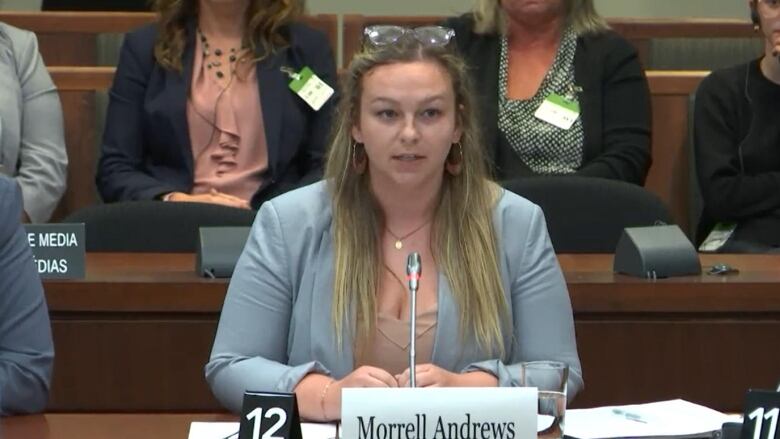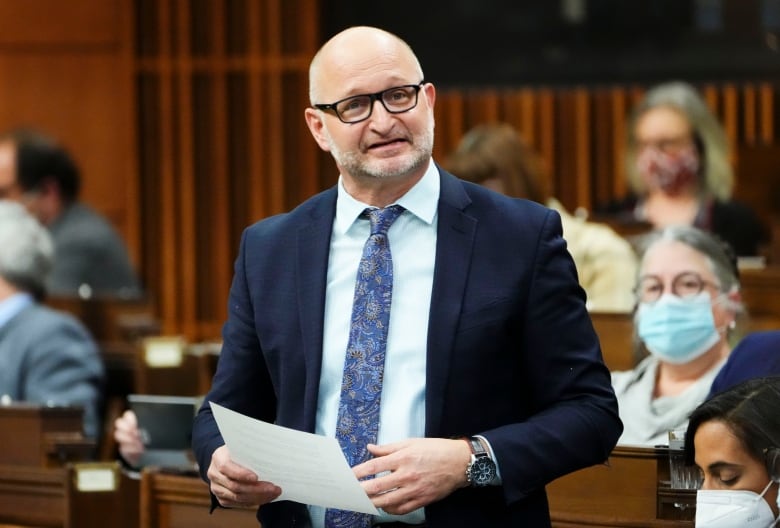Justice committee pushes government to drop blanket publication bans for sexual assault cases
Advocates say automatic bans rob victims of ability to speak publicly about their experiences

The House of Commons justice committee is calling on the government to change the Criminal Code to allow victims of sexual assault toopt out of publication bans.
Such bans are intended to protect victims by prohibiting the publication of information that could identify thempublicly in relation to their case.
But a report tabled in the House of Commons on Wednesday recommends among other things that the law be changed so thatpublication bans are not imposed onvictims without their consent.
The report which received unanimous support from the committee's MPs followed a months-long study looking at how the government can improve supports for victims of crime.
They said this ban was in my best interest but I felt trapped.- Morrell Andrews, sexualassault victim
In October, MPs heard from Morrell Andrews, a sexual assault victim turned advocate. Shetold the committee that a publication ban was placed on her name without her consent and she later had to fight to remove it a process she called "humiliating."
Andrews said she wanted the freedom to speak publicly about her experience. But doing so and breaking the publication ban would have meant facing criminal charges with a potential maximum sentence of up to two years in jail and a $5,000 fine.
"They said this ban was in my best interest but I felt trapped," she told the MPs.
Andrews told CBC she feels "humbled and elated" by the committee's recommendations, addingit "finally recognizes that there's a gap in the Criminal Code."
"What matters most is that victim complainants are provided with a choice in the matter of whether or not a publication ban is placed on your identity" she said.
"Not everybody wants to be anonymous."
The report also called for a number of updates to the Canadian Victims Bill of Rights, passed by Stephen Harper's Conservative government in early 2015. The committee called on the government toestablish aright for victims to access support programs and to ensurenecessary information about the criminal justice system is provided to victims automatically, rather than upon their request.
Justice Minister David Lametti hasn't ruled out adopting the recommendations into law including the oneonpublication bans.
"We're definitely in favour of not re-traumatizing victims of sexual assault in the court process," Lametti said Thursday. "We're always open to making improvements."
A spokesperson forLametti's office told CBCNews that the government will respond to the committee's report "in due course."

NDP MP Laurel Collins, who is sponsoring a petition in the House of Commons calling for similar changes to the law, said it's "encouraging" to see support for those changes gather momentum.
"New Democrats will keep pushing the government to listen to what survivors want and need, and to fix the patriarchal denial of survivors' consent when it comes to publication bans," Collins said in a mediastatement.
Pam Hrick, executive director and general counsel of the Women's Legal Education and Action Fund, said changing the lawon publication bans would be "low-hanging fruit for the government to act on." But any changes should respect the advice of victims, she added.
"It's so important, I think, to have a simplified process and rules around ensuring that survivors know whether there is a publication ban in place in their proceedings and that they have an easy way to remove it if that is what they want," Hrich said.
Andrews said she is optimistic the changes can be made quickly, given the report received support from all political parties.
"There's a lot of work ahead. But based on the conversations that I've had so far, I believe that this is something that is not controversial," she said. "It's really a simple fix."
With files from The Canadian Press












_(720p).jpg)


 OFFICIAL HD MUSIC VIDEO.jpg)
.jpg)



























































































